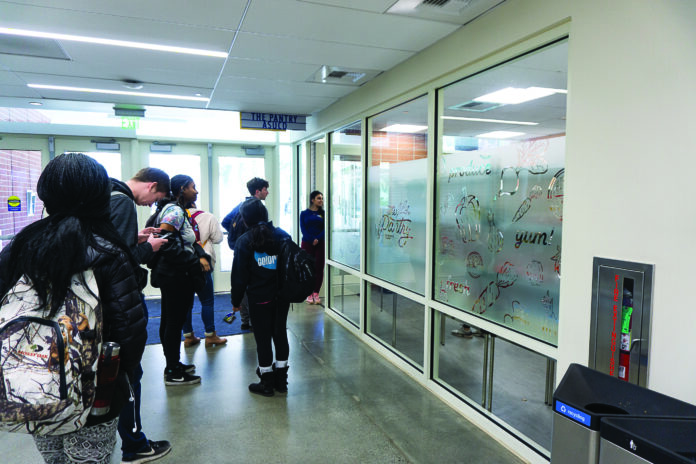Newly incorporated products like diapers, tampons and pads were added in response to demand
At UC Davis, need-based programs like The Pantry have adjusted their services to accommodate for the new food-related and basic need demands required during pandemic-induced hardships.
The Pantry has shifted operating standards to meet COVID-19 health guidelines. Moving from an indoor to an outdoor platform in March 2020, The Pantry is now located in front of the UC Davis Memorial Union. Two new programs in which students are able to access fresh produce and other basic essential items have been launched: the Build-A-Bag program and the Monthly Food Box program. These programs were launched in collaboration with Student Dining Services with funding from a U.S. Department of Agriculture grant, through which students have access to perishables such as meat and dairy. Perishable items were previously not provided before the pandemic because of the lack of refrigeration resources.
“It’s fantastic,” said Adrian Garcia, a volunteer at The Pantry and fourth-year genetics major. “It’s refrigerated, it’s cool, it’s in a box and [gives] enough time for patrons to get the box and go back to their place.” Garcia, who has recently been gathering donations, admires the work being done within The Pantry.
These programs come to aid many students during this uncertain time, with many students facing the hardship of accessing basic needs. A spring 2020 report by The Hope Center found that nearly 3 in 5 students were experiencing basic needs insecurity, and 38% of students at four-year institutions were experiencing food insecurity.
“[The] COVID-19 pandemic changed the way I wanted us to execute our vision,” said Ryan Choi, the Director of The Pantry and a fourth-year psychology student. “I wanted us to move from a quantity-based system, where every student is limited to three or five items […] to an equity-based system where students can come and take what they needed.”
The Pantry reported an increase in physical donations from local community members, stores, organizations and food banks, such as the Yolo Food Bank, which currently provides more than 200,000 pounds of food and reserves a $300,000 subsidy for the UC Davis community. The non-profit also recently received $500,000 through the Yolo Cares Act passed by the Yolo County Board of Supervisors to help with COVID-19 relief and economic security.
“We hope that the availability of food [with] our partnerships through The Pantry and Aggie Compass Basic Needs Center enables students to excel academically through an otherwise challenging time,” said Joy Cohan, the director of philanthropic engagement at Yolo Food Bank.
Other essential items provided by The Pantry include the usual hygienical products such as shampoo, conditioner and toothbrushes, and newly-incorporated products like diapers, tampons and pads.
Mirko Dirzo, a fifth-year psychology student, is one of the many students who uses The Pantry’s services.
“The Pantry is super important because a lot of people are not working, or if they are working, not a lot, like me, so money is tight,” Dirzo said. “The Pantry gave me food. I was able to eat.”
Other services such as CalFresh, a statewide need-based food service, are promoted by The Pantry’s members to meet student demand, according to Bonny Huynh, a fourth-year clinical nutrition major and volunteer at the Pantry who uses CalFresh herself to order contactless grocery delivery.
But as food-related concerns are becoming more prominent, health-related concerns due to COVID-19 do as well. Members of The Pantry are now required to wear masks and gloves, sanitize all equipment and stand 6 feet apart. Due to the limitations of operating in a small space, The Pantry’s member-to-students-served ratio dropped from 1:37 to 1:8 and now only operates with a staff of 60, a more than 50% reduction in the original staff. The Pantry still serves 200 students weekly, but hopes to increase to 800.
“Regardless of whether there is a pandemic or not, I would still work/volunteer for The Pantry, as our vision remains the same—making sure no student ever has to miss a meal or go without basic necessities,” Huynh said.
Choi, however, worries about the health of the team—from contracting COVID-19 to being overworked.
“Since March, we’ve been in a state of emergency for my pantry team,” Choi said. “It doesn’t feel like that right now because we’ve been working since March non-stop. If you put a frog in boiling water, it’ll jump out because it senses it’s in danger. When you put a frog in cold water and slowly increase the temperature, the frog will boil to death before it knows it.”
Written by: Annette Campos — campus@theaggie.org





